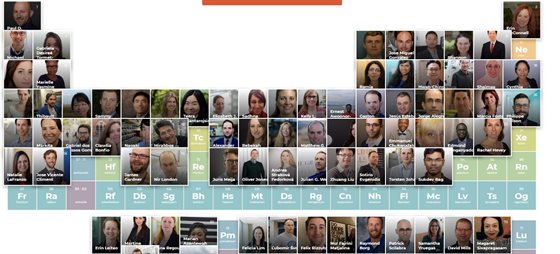A chemist from De Montfort University Leicester (DMU) is in his element after being named on a new Periodic Table celebrating the world’s best young chemists.
Dr Phillippe Wilson, Senior Lecturer VC2020 in Biological Chemistry and Cheminformatics, is one of 118 people from all over the world who will feature on the table, curated by the International Union of Pure and Applied Chemistry (IUPAC).

The idea behind the new periodic table is to challenge stereotypes about what a chemist looks like and to highlight the diversity of careers, creativity and dedication of the people working in chemistry today.
The IUPAC decided to update the periodic table to celebrate its 100th anniversary and the International Year of the Periodic Table. Different elements are announced monthly at chemistry events around the world, with the final ones revealed at the IUPAC World Chemistry Congress in Paris in July this year.

Philippe was nominated for the accolade by one of his PhD students and is now the face of Krypton, one of the noble gases. You can read his profile here
He joked: “As a DC Comics fan, I’m delighted to be Krypton!” – a reference to the home of Superman comics. Dr Wilson added: “There is an important message behind the table, which is to show that chemists are not all from the same mould but that there is a huge diversity in the profession.”
RELATED NEWS:
* Interested in studying at DMU? Book onto an open day
* Research looks at early detection of breast cancer
* DMU academic appointed as government advisor
Part of the criteria for nomination was that the person’s work should have a link to the United Nations’ Sustainable Development Goals, which set out a series of ambitions to improve life for people and the planet.
Philippe is a VC2020 Senior Lecturer in Biological Chemistry and Cheminformatics. He is also chair of the Royal Society of Biology’s East Midlands branch and a Fellow of the Linnean Society of London.
Last year, he was named in Forbes magazine’s 30 under 30 Europe, which features 300 people transforming 10 sectors including technology, industry, finance and art.
His research group is supported by funding from Cancer Research UK, the Engineering and Physical Sciences Research Council, the Science and Technologies Facilities Council and The Royal Society. His work is examining how to make potential indicators of cancer easier to detect.
One project, with Professor Melissa Mather at the University of Nottingham includes the creation of new sensors for the early detection of breast cancer.
Posted on Tuesday 9 April 2019